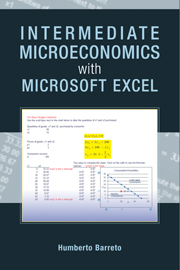Book contents
- Frontmatter
- Contents
- Preface
- User Guide
- Introduction
- PART I THE THEORY OF CONSUMER BEHAVIOR
- PART II THE THEORY OF THE FIRM
- 2.1 Production Function
- 2.2 Input Cost Minimization
- 2.3 Output Profit Maximization
- 2.4 Input Profit Maximization
- 2.5 Consistency in the Theory of the Firm
- 2.6 Monopoly
- 2.7 Game Theory
- PART III THE MARKET SYSTEM
- Conclusion
- Index
2.7 - Game Theory
from PART II - THE THEORY OF THE FIRM
Published online by Cambridge University Press: 05 June 2012
- Frontmatter
- Contents
- Preface
- User Guide
- Introduction
- PART I THE THEORY OF CONSUMER BEHAVIOR
- PART II THE THEORY OF THE FIRM
- 2.1 Production Function
- 2.2 Input Cost Minimization
- 2.3 Output Profit Maximization
- 2.4 Input Profit Maximization
- 2.5 Consistency in the Theory of the Firm
- 2.6 Monopoly
- 2.7 Game Theory
- PART III THE MARKET SYSTEM
- Conclusion
- Index
Summary
Von Neumann hovered for a moment by two rather sloppily dressed graduate students who hunched over a peculiar-looking piece of cardboard. It was a rhombus covered with hexagons. It looked like a bathroom floor. The two young men were taking turns putting down black and white go stones and had very nearly covered the entire board.
Later that evening, at a faculty dinner, he buttonholed Tucker and asked, with studied casualness, “Oh, by the way, what was it they were playing?” “Nash,” answered Tucker, allowing the corners of mouth to turn upwards ever so slightly, “Nash.”
Sylvia NasarPerfect competition: Firms are price takers with no power to affect the market price; optimize by choosing q to equalize MC and P.
Monopoly: the sole seller of a product with no close substitutes; optimize by choosing q to equalize MC and MR and then charge the highest price that clears the market (given by the demand curve).
In both market structures, the profits of the individual firm are not affected by what any other firm does. In perfect competition, there are so many other firms that Firm i does not care about what Firm j is doing. In monopoly, there is no other firm to worry about.
What about market structures between the extremes of perfect competition and monopoly?
Oligopoly is a market dominated by a few firms that are interdependent. In other words, what each individual firm chooses does affect the profits of the other firm.
- Type
- Chapter
- Information
- Intermediate Microeconomics with Microsoft Excel , pp. 407 - 418Publisher: Cambridge University PressPrint publication year: 2009



